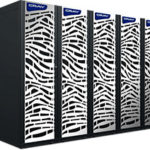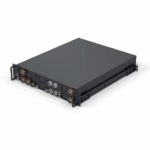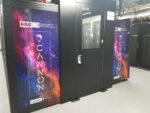In this interview, Dr. Meyer discusses AMAX’s focus on appliances for storage, cloud, and hyper-scale integration. Dr. Meyer goes into more depth about why training in AI is now moving to deploying models at the edge, and why 2nd Generation Intel Xeon Scalable processors can be a good fit for such tasks given their advancements in machine learning and security technologies.
UMass Dartmouth Speeds Research with Hybrid Supercomputer from Microway
UMass Dartmouth’s powerful new cluster from Microway affords the university five times the compute performance its researchers enjoyed previously, with over 85% more total memory and over four times the aggregate memory bandwidth. “The UMass Dartmouth cluster reflects a hybrid design to appeal to a wide array of the campus’ workloads. “Over 50 nodes include Intel Xeon Scalable Processors, DDR4 memory, SSDs and Mellanox ConnectX-5 EDR 100Gb InfiniBand. A subset of systems also feature NVIDIA V100 GPU accelerators. Equally important are a second subset of POWER9 with 2nd Generation NVLink- based- IBM Power Systems AC922 Compute nodes.”
Lenovo and Intel Partner for VSC-4 Supercomputer in Vienna
Today Lenovo and Intel announced their collaboration to modernize HPC infrastructure at Austria’s most powerful supercomputer – the Vienna Scientific Cluster-4 (VSC-4). Built on Lenovo ThinkSystem servers and 2nd generation Intel Xeon Scalable processors, VSC-4 supports more than 300 research projects led by scientists from higher education institutions throughout Austria, covering life-enhancing challenges such as meteorology to materials science, quantum chemistry to genetics.
Tyan Showcases Intel Xeon Solutions for HPC, AI, and the Edge
In this video from SC19, Philip Maher from Tyan describes the company’s latest lineup of HPC and storage server platforms based on Intel Xeon Scalable Processors. “Data is the foundation of the new economy, and how organizations effectively move, store and process will help determine their level of success,” said Danny Hsu, Vice President of MiTAC Computing Technology Corporation’s TYAN Business Unit. “By leveraging the 2nd gen Intel Xeon Scalable processors, TYAN’s leading portfolio of HPC, storage and cloud server platforms enable to help our customers accelerate innovation, drive business value, and bring products and services to market faster.”
Intel Unveils New GPU Architecture and oneAPI Software Stack for HPC and AI
Today at SC19, Intel unveiled its new GPU architecture optimized for HPC and AI as well as an ambitious new software initiative called oneAPI that represents a paradigm shift from today’s single-architecture, single-vendor programming models. “HPC and AI workloads demand diverse architectures, ranging from CPUs, general-purpose GPUs and FPGAs, to more specialized deep learning NNPs which Intel demonstrated earlier this month,” said Raja Koduri, senior vice president, chief architect, and general manager of architecture, graphics and software at Intel. “Simplifying our customers’ ability to harness the power of diverse computing environments is paramount, and Intel is committed to taking a software-first approach that delivers unified and scalable abstraction for heterogeneous architectures.”
Intel showcases New Class of AI Hardware from Cloud to Edge
Today Intel unveiled new products designed to accelerate AI system development and deployment from cloud to edge. “In its key announcement, Intel demonstrated its Intel Nervana Neural Network Processors (NNP) for training (NNP-T1000) and inference (NNP-I1000) — Intel’s first purpose-built ASICs for complex deep learning with incredible scale and efficiency for cloud and data center customers. Intel also revealed its next-generation Intel Movidius Myriad Vision Processing Unit (VPU) for edge media, computer vision and inference applications.”
Cray CS-Storm Supercomputer coming to HLRS in Germany
Today Cray announced that the High-Performance Computing Center of the University of Stuttgart (HLRS) in Germany has selected a new Cray CS-Storm GPU-accelerated supercomputer to advance its computing infrastructure in response to user demand for processing-intensive applications like machine learning and deep learning. “The Cray CS-Storm combined with the unique Cray-CS AI and Analytics suite will allow HLRS to better tackle converged AI and simulation workloads in the exascale era.”
GMS Launches Ruggedized TITAN AI-Equipped Rackmount Servers
Today General Micro Systems (GMS) launched TITAN, the industry’s first sealed, fanless, conduction-cooled rackmount servers with artificial intelligence (AI) and mil-circular (38999) connectors for superior ruggedness in the most demanding defense and aerospace applications. The American-designed, sourced, and manufactured TITAN, a fully configurable server, also uses up to four of Intel’s latest 2nd gen Scalable […]
Harvard Names New Lenovo HPC Cluster after Astronomer Annie Jump Cannon
Harvard has deployed a liquid-cooled supercomputer from Lenovo at it’s FASRC computing center. The system, named “Cannon” in honor of astronomer Annie Jump Cannon, is a large-scale HPC cluster supporting scientific modeling and simulation for thousands of Harvard researchers. “This new cluster will have 30,000 cores of Intel 8268 “Cascade Lake” processors. Each node will have 48 cores and 192 GB of RAM.”
Lenovo and Intel Power Data-Intensive Science at the Flatiron Institute
Today Lenovo and Intel revealed how their collaboration on joint technology solutions that accelerate the convergence of HPC and AI are helping scientists at the Flatiron Institute solve scientific challenges in entirely new ways. “Seeing some of the greatest minds rely upon our technology to discover answers for some of humanity’s most pressing questions is rewarding. But pushing the boundaries of HPC and AI capabilities even further so more people can benefit is what drives us.”













